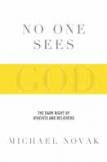A Sweaty Struggle
Some of us labor sweatily” in the search for God, Michael Novak writes, “others are borne on eagle’s wings.” That Novak himself finds the search a sweaty and laborious struggle is clear on every page of this powerful book. He wrote it, he tells us in his preface, “for people who, like me, have spent long years in the dark and windswept open spaces between unbelief and belief.” He is in good company. He gropes through darkness with people like Blessed Teresa of Calcutta, St. John of the Cross, Job and Moses, who, as Scripture says, “endured as seeing him who is invisible” (Heb 11:27).
Plato, Aristotle and all the ancients (with rare exceptions) knew—not merely believed—that there is a first principle of intelligence suffusing the world. Unaided human reason led them, as it can lead us, to acknowledge that God exists. Such knowledge still leaves us in darkness, however, about who God is. That God can be described only through metaphor is a central truth of both Judaism and Christianity. “No man sees me and lives,” God told Moses (Ex 33:20). Indeed, Scrip-ture speaks of the “thick darkness” encountered by those trying to draw close to God (Ex 20:21; 1 Kgs 8:12).
In the search for God, I realized long ago that I belong to those who are “borne on eagle’s wings.” Too simple-minded to feel the force of the arguments against God’s existence, from childhood I have believed it all: God, Trinity, angels, the communion of saints, sacraments, the real presence of Christ in the Eucharist. For me it is all simply and obviously true. I resonate with the psalmist’s twice-repeated verse: “The fool has said in his heart, there is no God” (Ps 14:1; 53:1). How reassuring to discover recently that I too am in good company. Writing in the October 2008 issue of First Things, Richard John Neuhaus confides his own “enormous sense of relief” at discovering in his youth the confession of the Church of Scotland theologian, Donald Baillie, “that as long as he could remember he could not not believe in the existence of God.”
Why has God made belief easy for some but so difficult for others? Perhaps it is because those who “labor sweatily” are made of sterner stuff. Addressing those who find belief not merely difficult but impossible, Novak puts forth his “underlying thesis: that unbelievers and believers need to learn a new habit of reasoned and mutually respectful conversation.” Atheists and believers alike, Novak contends, stand on common ground. No one can reach God through the senses, imagination or memory; not even by a clear, distinct concept. “The only knowledge of God we have through reason…is dark—and by the via negativa, that is, by reasoning from what God cannot be. Direct empirical knowledge of God could only be of a false God.” Here too Novak is articulating a central affirmation of both Judaism and Christianity.
Throughout No One Sees God, Novak (who holds the Jewett Chair in Religion, Philosophy and Public Policy at the American Enterprise Institute) models the reasoned and mutually respectful conversation he asks of others. He calls Christopher Hitchens, one of today’s most articulate atheists writing in English, a friend and “one of the writers whose courage and polemical force I highly admire,” in particular for Hitchens’s willingness to criticize his ideological soul- mates when they are wrong on some important matter—“the acute threat from Islamo-fascism, for example.” Moreover, “Hitchens does his homework and he thinks clearly. If you go to debate him, you had better think things through rather carefully and well, for his is a well-stocked, quick, and merciless mind.”
Novak faults atheists, however, for their unwillingness to question their own positions. While claiming to “question everything,” the currently popular books of atheists like Sam Harris, Daniel C. Dennet and Richard Dawkins contain no evidence that their authors have ever questioned their own atheism or the cruelty and mass bloodshed perpetrated in the last century by totalitarian regimes claiming to be motivated by “scientific atheism.”
Though atheism is pervasive in American universities today, both in its hard version (hatred of religious belief) and its soft one (denial that there is such a thing as truth, but merely a myriad of opinions), “it has not proved persuasive to huge numbers of students, who hold their noses and put up with it. Why does atheism persuade so few? Our [atheist] authors never ask.” Moreover, “Everywhere on earth except Western Europe, religion is surging.” Atheists offer no explanation for this surge save as the triumph of superstition over enlightenment.
No review can possibly do justice to the riches offered in the pages of this book. Even at his most forceful, Novak maintains the courtesy and respect he asks of his opponents. An appendix reprints the lecture he delivered in London’s Westminster Abbey in May 1994, when he received the Templeton Prize, given annually to an “entrepreneur of the spirit” who has made an exceptional contribution to “affirming life’s spiritual dimension, whether through insight, discovery, or practical works.” The inclusion of this text is a plus—a ringing affirmation of the importance of truth, honesty and courage.
This article also appeared in print, under the headline “A Sweaty Struggle,” in the December 8, 2008, issue.








